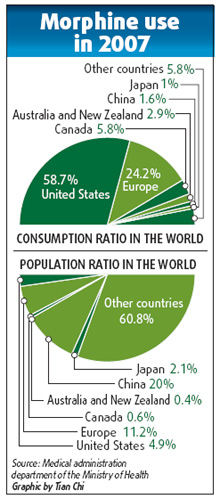Proper use of controlled drugs urged
The health authorities have urged healthcare professionals across the country to improve the clinical application and administration of narcotics and other specially controlled medicines, in the latest move to ensure medical quality and safety.
"These medicines can help people if used properly. But they can also cause dependence or even addiction if used improperly, which would seriously affect people's health," Zhao Minggang, deputy director of the medical administration department under the Ministry of Health (MOH), said at the launch of a training program in Beijing over the weekend.
The specially controlled medicines include narcotics, psychotropic substances, toxic drugs for medical use and radioactive drugs, according to China's Pharmaceutical Administration Law revised in 2001.
In the country, narcotics such as morphine, codeine and ketamine are used clinically for relieving pain; while psychotropic substances such as barbital and triazolam are mainly for improving sleep or relieving anxiety and tension, according to the ministry.
Co-organized by the MOH and the State Food and Drug Administration (SFDA), the three-year program covers about 100,000 pharmacists, doctors and nurses at 332 cities of 31 provinces, municipalities and autonomous regions.
They will be trained in the knowledge of relevant laws and the effective use of special medicines in treatment.
"Lacking relevant knowledge, a number of medical workers are too strict in controlling the amount of narcotics when prescribing them. The low doses do not relieve pain but instead inflict it on the patients, especially patients suffering from advanced cancer," Zhao said.
There is also a growing need for these medicines as more people are suffering from anxiety, sleeplessness and even fatal diseases when living and working under greater pressure, said Wang Zhexiong, deputy director of the safety supervision department under the SFDA.
 0
0 







